 WUFU, China-Angry parents whose children were crushed to death in schools that collapsed in China's mighty earthquake are no longer being allowed to march, wave banners and vent their rage in public. Officials are now using a variety of tactics—threats, money, promises of justice, police muscle—to intimidate, appease or hush up the grieving mothers and fathers who believe that nearly 7,000 classrooms crumbled so easily because corrupt and incompetent officials didn't build them properly.Two months after the quake, seething anger runs through the town of Wufu, with its green rice fields and concrete farm houses. Wufu became a hotbed of quake protests after the town's Fuxin No. 2 Primary School caved in, killing 127 students."Police from Deyang came to our town and warned us not to gather," said Pi Kaijian, a 43-year-old farmer who wore pointy Italian-style loafers and polyester pants rolled up past his calves as he endured the afternoon heat in the courtyard of his house."The police met with our parent leaders and said if we gathered, it would be a criminal act and we'd be arrested," said the farmer, whose 11-year-old son died in the school.In the weeks after the quake, parents in Wufu vented their rage over buildings they say were shoddily constructed by grabbing pictures of their dead children and marching to the government headquarters in Deyang, the nearest big city.Such protests were tolerated for a time after the 7.9-magnitude quake, but then came the police warnings to stay off the streets.After winning global praise for acting like an open society and allowing the parents to protest after the disaster, China is reverting to the tactics of a communist police state ready to crush any dissent.The Deyang police spokesman, who declined to give his name, doubted Pi's account. "This probably isn't true," he told The Associated Press before declining to answer more questions.The deputy director of the propaganda office of the Deyang police said he was unaware of the alleged threats. "We police haven't been in touch with those parents. We have allowed them to raise their case," the official, who would only give his surname, Luo, told The Associated Press before hanging up the phone after refusing to say more.The alleged police threats didn't scare the parents, Pi said. But they decided to cool it after officials promised to wrap up an investigation of the school's collapse before July 15, he said."They said we would be satisfied with the probe's results, so we decided to be patient and give them some time. But I seriously doubt we'll be satisfied and we'll continue protesting," he said.Elsewhere in Sichuan's quake zone, crews were busy clearing away rubble left by the quake that killed nearly 70,000 people and left 5 million homeless. Shops were reopening and street markets were bustling as life began returning to normal. Huge developments of temporary homes were springing up in fields covered in a freshly poured layer of concrete.As they tried to cope with their losses, some parents seemed to be driven by a deep sense of nihilism, a feeling they could challenge the government because they had nothing more to lose now that their only child was gone. They were poor farmers or workers who obeyed China's one-child policy. Many were too old or impoverished to try to have another child.Without children, their lives seemed to lack the hopes that made the drudgery of rural Chinese life bearable.Zhou Lekang, a poor farmer in bare feet caked with dried rice paddy mud, beamed with pride when he talked about how his 16-year-old son wanted to be a diplomat and spent his evenings studying English or classical Chinese literature. The man had just saved up enough money to buy his son a computer when the boy started high school.But his son was among 270 others who died when the school collapsed in the town of Juyuan, about a 45-minute drive from the provincial capital, Chengdu.Zhou said the government paid him $3,495 in insurance and consolation payments, and officials promised to pay $2,912 more later. As China's economy continues to boom, the government has more money in its coffers to defuse protests with cash.But Zhou said what he wanted most was justice, and he pledged to keep protesting if he had to. "Now that I've lost my child, I fear nothing," he said.China's leadership is particularly sensitive about the school collapses because they touch a nerve with people across the country and the government fears sympathy for the parents could inspire protests in other parts of China ahead of the Beijing Olympics in August.Last month, police began blocking the parents from going to the collapsed middle school. Zhou also said the most active parents had become silent. "All we know is that officials went to talk to them, and after that, they stopped being active. We don't hear from them anymore," he said.It's common in China for officials to break up a protest group by threatening the leaders or buying them off. This renders the movement directionless or riven with suspicion or resentment.But often, China just favors a big show of police force. In the city of Dujiangyan, police shut down a block-long section of road in front of the Xinjian Elementary School, where hundreds of students died. Six police were posted on each end of the block, discouraging protesters from coming near. A cluster of police guarded the school's main gate.One parent, who asked not to be named because he feared reprisals, said officials were tapping phones and monitoring the parents' movements."Parents who work for state-owned companies are being kept really busy at work," he said, counting himself among the targeted. "They're being given a little extra salary and no time to do anything else. Some are being talked to individually. They're being threatened."
WUFU, China-Angry parents whose children were crushed to death in schools that collapsed in China's mighty earthquake are no longer being allowed to march, wave banners and vent their rage in public. Officials are now using a variety of tactics—threats, money, promises of justice, police muscle—to intimidate, appease or hush up the grieving mothers and fathers who believe that nearly 7,000 classrooms crumbled so easily because corrupt and incompetent officials didn't build them properly.Two months after the quake, seething anger runs through the town of Wufu, with its green rice fields and concrete farm houses. Wufu became a hotbed of quake protests after the town's Fuxin No. 2 Primary School caved in, killing 127 students."Police from Deyang came to our town and warned us not to gather," said Pi Kaijian, a 43-year-old farmer who wore pointy Italian-style loafers and polyester pants rolled up past his calves as he endured the afternoon heat in the courtyard of his house."The police met with our parent leaders and said if we gathered, it would be a criminal act and we'd be arrested," said the farmer, whose 11-year-old son died in the school.In the weeks after the quake, parents in Wufu vented their rage over buildings they say were shoddily constructed by grabbing pictures of their dead children and marching to the government headquarters in Deyang, the nearest big city.Such protests were tolerated for a time after the 7.9-magnitude quake, but then came the police warnings to stay off the streets.After winning global praise for acting like an open society and allowing the parents to protest after the disaster, China is reverting to the tactics of a communist police state ready to crush any dissent.The Deyang police spokesman, who declined to give his name, doubted Pi's account. "This probably isn't true," he told The Associated Press before declining to answer more questions.The deputy director of the propaganda office of the Deyang police said he was unaware of the alleged threats. "We police haven't been in touch with those parents. We have allowed them to raise their case," the official, who would only give his surname, Luo, told The Associated Press before hanging up the phone after refusing to say more.The alleged police threats didn't scare the parents, Pi said. But they decided to cool it after officials promised to wrap up an investigation of the school's collapse before July 15, he said."They said we would be satisfied with the probe's results, so we decided to be patient and give them some time. But I seriously doubt we'll be satisfied and we'll continue protesting," he said.Elsewhere in Sichuan's quake zone, crews were busy clearing away rubble left by the quake that killed nearly 70,000 people and left 5 million homeless. Shops were reopening and street markets were bustling as life began returning to normal. Huge developments of temporary homes were springing up in fields covered in a freshly poured layer of concrete.As they tried to cope with their losses, some parents seemed to be driven by a deep sense of nihilism, a feeling they could challenge the government because they had nothing more to lose now that their only child was gone. They were poor farmers or workers who obeyed China's one-child policy. Many were too old or impoverished to try to have another child.Without children, their lives seemed to lack the hopes that made the drudgery of rural Chinese life bearable.Zhou Lekang, a poor farmer in bare feet caked with dried rice paddy mud, beamed with pride when he talked about how his 16-year-old son wanted to be a diplomat and spent his evenings studying English or classical Chinese literature. The man had just saved up enough money to buy his son a computer when the boy started high school.But his son was among 270 others who died when the school collapsed in the town of Juyuan, about a 45-minute drive from the provincial capital, Chengdu.Zhou said the government paid him $3,495 in insurance and consolation payments, and officials promised to pay $2,912 more later. As China's economy continues to boom, the government has more money in its coffers to defuse protests with cash.But Zhou said what he wanted most was justice, and he pledged to keep protesting if he had to. "Now that I've lost my child, I fear nothing," he said.China's leadership is particularly sensitive about the school collapses because they touch a nerve with people across the country and the government fears sympathy for the parents could inspire protests in other parts of China ahead of the Beijing Olympics in August.Last month, police began blocking the parents from going to the collapsed middle school. Zhou also said the most active parents had become silent. "All we know is that officials went to talk to them, and after that, they stopped being active. We don't hear from them anymore," he said.It's common in China for officials to break up a protest group by threatening the leaders or buying them off. This renders the movement directionless or riven with suspicion or resentment.But often, China just favors a big show of police force. In the city of Dujiangyan, police shut down a block-long section of road in front of the Xinjian Elementary School, where hundreds of students died. Six police were posted on each end of the block, discouraging protesters from coming near. A cluster of police guarded the school's main gate.One parent, who asked not to be named because he feared reprisals, said officials were tapping phones and monitoring the parents' movements."Parents who work for state-owned companies are being kept really busy at work," he said, counting himself among the targeted. "They're being given a little extra salary and no time to do anything else. Some are being talked to individually. They're being threatened."As in the days of Noah....
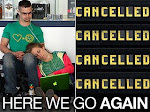
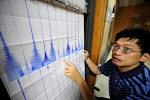

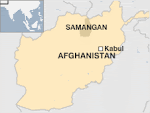







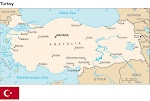
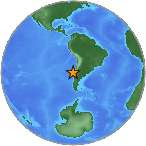




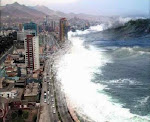

.jpg)


.bmp)
No comments:
Post a Comment